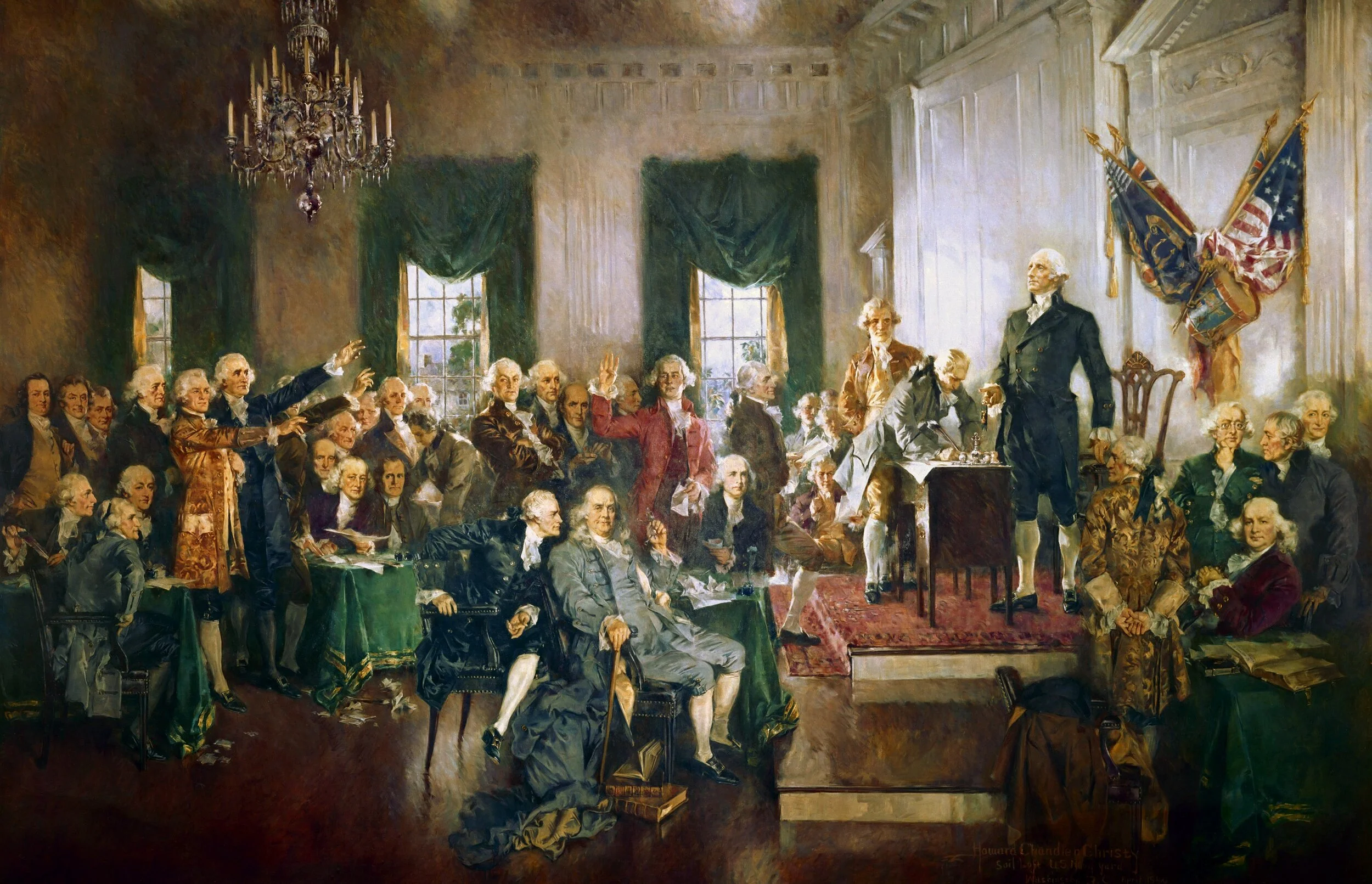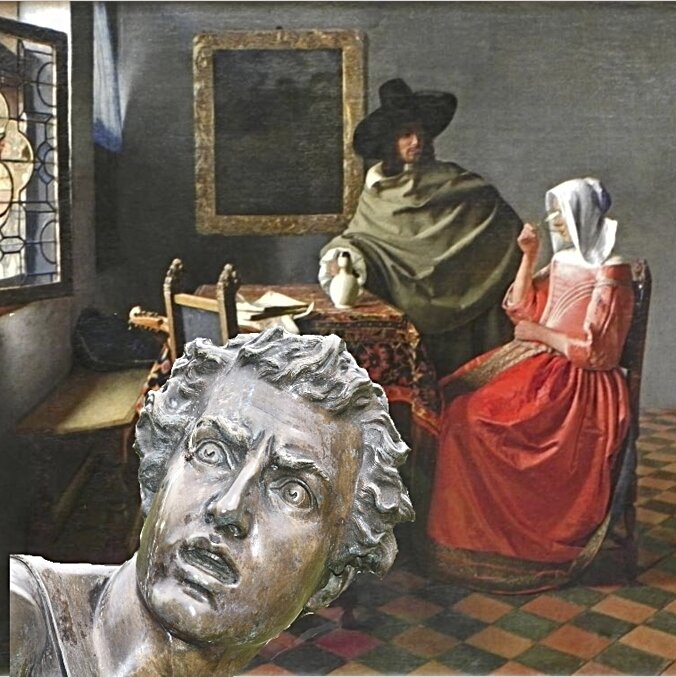Rights & Duties in Ordinary Times
/Doctors and nurses during the covid pandemic and first responders on 9/11 are often cited for their great service to the community. So, too, are military personnel. But those who do great deeds in moments of crisis aren’t the only good citizens.
Most of us are never called on to do any great deed. But the character of the nation is determined mostly by how ordinary citizens behave during ordinary times. Here is a list of rights and duties — or just good things to do — as a citizen and a member of a society.
Doing what you like
Jan Vermeer: The Glass of Wine
Citizens owe much to their community and to their nation. But that obligation occupies a small slice of the citizen’s time. Most of the time, citizens ought to be minding their own business, tending their own garden, chasing their own dreams, and doing their own thing. Any nation that demands all or most of the people’s time and attention is a tyranny. The success of a nation can be observed when citizens are out and about, doing what they like, harming no one else, but enjoying their lives without fear or deprivation. The preamble to the Constitution promises to promote “the general welfare” and ensure “the blessings of liberty.” Those are the end goals for which the United States exists. So, go on a picnic or learn to play the harmonica!
Getting along and going along
Most of the time, a good citizen ought to stay in line, pull their weight, and go with the flow. This item is just one of many in the list, but most citizens should do just this most of the time. Even if everything isn’t perfect, being amicable is often the right attitude. Thomas Jefferson said so in the Declaration of Independence: “Prudence, indeed, will dictate that Governments long established should not be changed for light and transient causes; and accordingly all experience hath shewn, that mankind are more disposed to suffer, while evils are sufferable, than to right themselves by abolishing the forms to which they are accustomed.”
Defending the Constitution
This one is probably the heaviest enforced – the most mandatory -- on the list. People are urged to vote. They are invited to join groups. They are allowed to donate to charities. But millions of Americans are compelled to swear to defend the Constitution as a condition of employment. Four members of my family have had to swear an oath to defend the Constitution at one time or another. It was never explained to any of us exactly what defending the Constitution means. No one ever confronted me, saying, “I’m going to harm the Constitution if you don’t stop me!”
Saying the pledge of allegiance
Swearing loyalty to a piece of cloth is the kind of thing that The Congenial Iconoclast asks you to think about. Just how sacred the flag truly is is a question worth discussing. But good citizenship doesn’t hinge on that question. The bottom line is that many people enjoy saying the pledge and feel good about doing it. That’s reason enough for those of us who think the practice odd to go along. Personally, I’d prefer to pledge “good will and fair dealing to all people.” I’d happily pledge a special level of good will to my fellow Americans. But as long as others feel the pledge signals something positive I’ll cheerfully say it along with them.
Displaying the flag, wearing a flag lapel pin
People like doing it, and it’s right to support what makes people happy. This assumes they are flying the American flag. Personally, I don’t mind if someone wants to fly the Irish flag, or the flag of some other nation too. The Confederate flag, though, gets a hard “No.” The Confederacy was a violent and criminal act of treasonous warfare against the US. It is impossible to be a patriotic American and view the Confederate flag (outside a museum) with anything less than scorn. Displaying the Confederate flag should have been made illegal in 1865, and it ought to be a crime today. Germany suppresses Nazi symbols, and the US ought to do the same for the Stars and Bars.
Singing the National Anthem
It’s hard. But its fun. Sing the national anthem every chance you get!
Obeying the law
Obeying the laws is one of the duties of a citizen we find on the short lists. And it is a good one. We should obey the laws as close to 100% of the time as we can.
Praying for peace, for justice, for relief of suffering, etc.
America’s current social and political malaise is caused, in part, by the failure of religion and religious leaders to uphold the highest moral standards and behaviors. In America’s happier past, churches exerted a positive influence on their members and earned respect from the wider community. Recently, churches and church leaders have misbehaved too much and have lost the respect of much of the population. “Fundamentalist Christian” is often shorthand in today’s society for racist and corrupt. But the faults of the people doesn’t diminish Almighty God. Asking help from “the maker of heaven and earth, of all things visible and invisible,” is a no-brainer if people do it with good will and sincerity.
Voting with Your Feet
Trying to change your community for the better is one good action. But there may come a point when the good citizen realizes that change isn’t going to happen. If the local majority adopts a policy that a citizen can’t abide, that citizen might be duty bound to leave and find a place with policies they like better. Immigrants by the millions vote their approval of America by coming here, and they make tremendous sacrifices to do it. More citizens ought to use mobility as a way of supporting communities they like, and of protesting unjust laws and practices.
Staying informed
This task is the most time consuming and perpetual on this list. To stay informed, you need to make an effort to read news about local, state, national and world affairs. And you need to get your news from many sources.
Serving on a jury
Serving on a jury is one of the items on the familiar short list of the duties of a citizen. Most Americans never do it, because they are never called. I’ve lived in the US most of my life and have always been registered to vote. But I was summoned to jury duty only once and I was not seated for a case even then. Most people I know say they would like to sit on a jury, but have never had the chance.
Voting
Your vote – your one, single, personal vote – will never change the outcome of any election. It is contrary to all evidence to think it might. It is also wrong to say, “If you don’t vote, you can’t complain.” Of course you can complain. You can complain if the person you voted for gets in office and does a bad job. You can complain if the person you voted for loses and the other candidate gets in and does a bad job. And you can complain if none of the candidates on the ballot are acceptable and you choose not to vote at all. Voting once a year is a weak and minimalistic way to exercise citizenship. Still, you should vote. Voting is quick and easy, and it signals your approval of the system, even when you don’t approve of the candidates.
Working on a political campaign
I say above that your vote will never determine the outcome of an election. If you want to have some real effect on outcomes, get involved in a campaign. It is easy to volunteer and to work your way into positions of responsibility. I did it myself, working for an Indiana congressman’s re-election bid. I was in charge of campaigning and party relations in four critical counties of the district, and my candidate won. I was too busy on election day to cast my one single vote, but I influenced hundreds of people.
Writing and publishing your opinion or thoughts
In this day of blogging and segmented media, it is easy to publish, but hard to build an audience. The best examples of people who made a big impact on their society by writing and publishing their views come from long ago. Consider Martin Luther and Rachel Carson. Luther was a Catholic monk who disagreed with the church on fundraising. In 1517, he posted a list of 95 specific complaints against the church on a bulletin board (which happened to be on the door of a church in Wittenburg, Germany). Luther challenged anyone who cared about the issues to debate him. One debate led to others, and eventually Luther faced the pope himself. And then Luther was banished. But eventually the church reformed in many of the ways Luther recommended. Rachel Carson wrote the book Silent Spring, and published it in 1962. She conjured up a vision of a dead world, killed by pesticides then in use. The world woke up to the dangers of chemicals, and DDT was banned.
Think:
Which of these surprises you most?
Do you disagree with any of these rights and duties?
Which do you see people around you doing most often? Least often?









